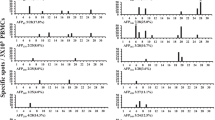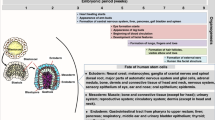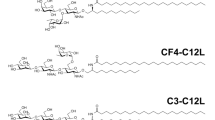Abstract
α FOETOPROTEIN (AFP) is a foetal protein produced in large quantities by the foetal liver, yolk sac, and certain tumours such as hepatomas and teratomas1,2. AFP does not cause immune response in a tumour-bearing host or in situations in which a transient increase in AFP takes place2. This apparent tolerance, however, can be broken in rabbits or mice by immunisation with heterologous2–4 or chemically modified homologous AFP (ref. 5). Both these approaches have been found effective in breaking tolerance to other antigens6. It has been shown that AFP-producing hepatoma cells are killed by anti-AFP antibodies in vitro7,8. AFP may thus be of potential use as target antigen in tumour immunotherapy.
This is a preview of subscription content, access via your institution
Access options
Subscribe to this journal
Receive 51 print issues and online access
$199.00 per year
only $3.90 per issue
Buy this article
- Purchase on Springer Link
- Instant access to full article PDF
Prices may be subject to local taxes which are calculated during checkout
Similar content being viewed by others
References
Abelev, G. I., Transplant. Rev., 20, 3–37 (1974).
Ruoslahti, E., Pihko, H., and Seppälä, M., Transplant. Rev., 20, 38–60 (1974).
Nishi, S., Watabe, H., and Hirai, H., J. Immun., 109, 957–960 (1972).
Goussev, A., and Yasova, A., in Colloques L'INSERM L'Alphafoetoproteine (edit. by Masseyeff, R.), 255–270 (1974).
Ruoslahti, E., Pihko, H., Becker, M., and Mäkelä, O., Eur. J. Immun., 5 7–10 (1975).
Weigle, W. O., Chiller, J. M., and Habicht, G., in Progress in Immunology (edit. by Amos, B.), 311 (Academic, New York and London, 1971).
Tsukada, Y., Mikuni, M., Watabe, M., Nishi, S., and Hirai, H., Int. J. Cancer, 13, 187–195 (1974).
Mizejewski, G., and Allen, R. P., Nature, 250, 50–52 (1974).
Pihko, H., Lindgren, J., and Ruoslahti, E., Immunochemistry, 10, 381–385 (1973).
Ruoslahti, E., and Seppälä, M., Int. J. Cancer, 8, 374–383 (1971).
Ruoslahti, E., and Seppälä, M., Nature, 235, 161–162 (1972).
Baldwin, R. W., Glaves, D., and Vose, B. M., Int. J. Cancer, 13, 135–142 (1974).
Steele, G., and Sjögren, H. O., Int. J. Cancer, 14, 435–444 (1974).
Hellström, I., and Hellström, K. E., Int. J. Cancer, 15, 1–16 (1975).
Hellström, K. E., and Hellström, I., Adv. Immun., 18, 209–277 (1974).
Pihko, H., and Ruoslahti, E., Int. J. Cancer, 12, 354–360 (1973).
Alexander, P., Nature, 235, 137 (1972).
Nishi, S., Watabe, H., and Hirai, H., Tumor. Res., 8, 17–22 (1973).
Author information
Authors and Affiliations
Rights and permissions
About this article
Cite this article
RUOSLAHTI, E., WIGZELL, H. Breakage of tolerance to α foetoprotein in monkeys. Nature 255, 716–717 (1975). https://doi.org/10.1038/255716a0
Received:
Accepted:
Issue Date:
DOI: https://doi.org/10.1038/255716a0
This article is cited by
-
Comparison of the evolution rates of cytosolic and mitochondrial aspartate aminotransferase
Nature (1978)
-
Recognition of antigens by T lymphocytes
Molecular and Cellular Biochemistry (1978)
Comments
By submitting a comment you agree to abide by our Terms and Community Guidelines. If you find something abusive or that does not comply with our terms or guidelines please flag it as inappropriate.



